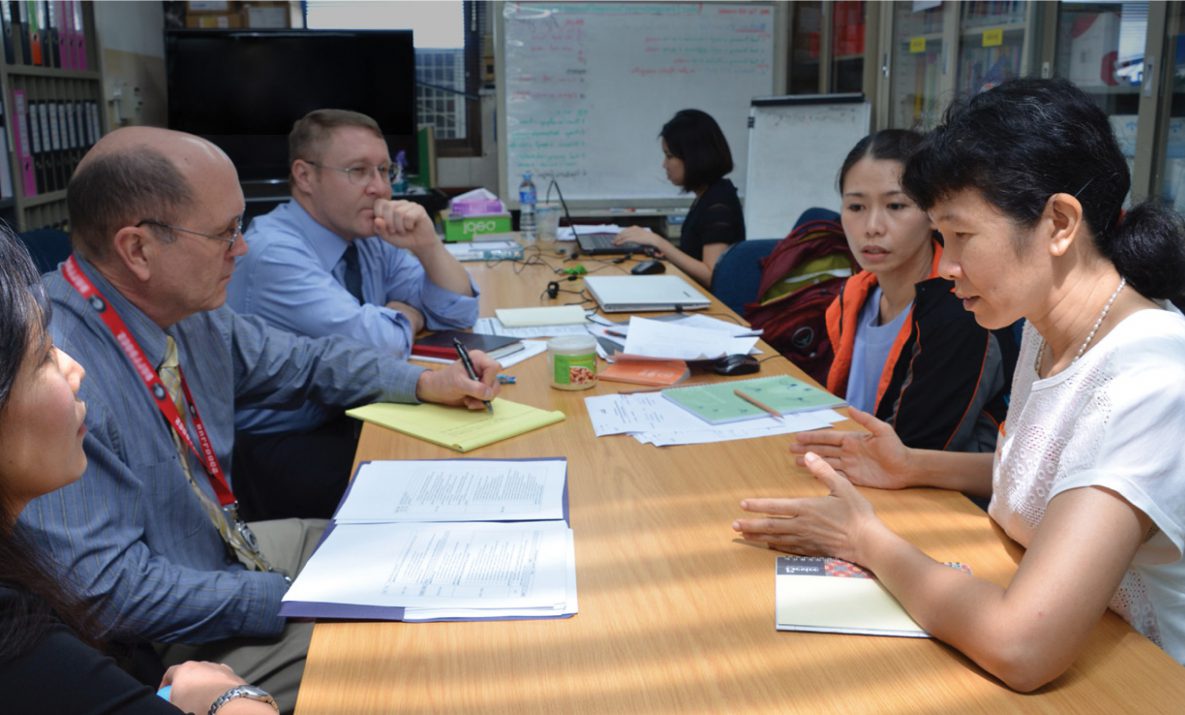Developing Multisector Solutions for Global Health Security
Improving global health security requires multisector solutions. In addition to government-to-government collaboration with ministries of health, ministries of agriculture, and other relevant ministries, CDC works with partner organizations to build and improve the capacity to prevent, detect and respond to disease outbreaks. CDC leverages partnerships with nongovernmental organizations, multilateral organizations, the private sector, and other stakeholders to support this mission with host governments and communities.
“It takes strong partnerships bringing together the best science and solutions across different sectors and technical areas to achieve meaningful progress in global health security. Together with CDC, we are committed to advancing global health security, in the United States and around the world.”
— Loyce Pace, Former GHC President and Executive Director; Jamie Nishi, GHTC Director; and Heather Ignatius, PATH Director of US & Global Advocacy — Co-Chairs of the Friends of CDC Global
Partnering with the World Health Organization
To improve global health security, CDC works with the World Health Organization (WHO) to develop standardized assessment tools and guidance for action planning to bring countries into compliance with the International Health Regulations (IHR 2005). CDC contributed to the development of the Joint External Evaluations (JEEs), a tool used to assess countries’ health security strengths and weaknesses, and CDC experts have participated in over 60% of the JEEs conducted thus far[1]. From 2016 to April 2022, 115 JEEs were completed, representing over half of the countries that committed to achieving the goals of the IHR 2005[2]. CDC also supports the development of National Action Plans for Health Security (NAPHS), which identify resources and define the actions needed to address the gaps identified by the JEE. This allows countries to select high-priority actions, arrange donor and/or domestic financing, and begin implementation immediately.
With these tools, countries can maintain high-level government attention on health security, attract additional resources, and target existing resources towards priority needs. CDC works closely with countries to identify priority actions from their NAPHS that could be undertaken immediately to improve their JEE scores. Through this process, Sierra Leone was able to lower the programmatic costs of achieving their health security priorities and align domestic resources to continue to build upon and sustain their achievements. Uganda also utilized their NAPHS to identify workforce development as a health security priority and secured 1.4 million U.S. dollars from private and non-profit sectors to build the country’s public health workforce capacity[3].

Partnering with Non-Governmental Organizations
Through its GHSA work, CDC is collaborating with the Global Health Security Agenda Consortium (GHSAC). The consortium is a formal member of the GHSA Steering Group and is made up of a collective of non-governmental organizations dedicated to promoting adherence to IHR 2005 and achieving the goals set out by the GHSA framework. With a diverse array of members, GHSAC works with GHSA member states and other countries to ensure multisectoral engagement and provide technical expertise across all areas related to global health security. CDC works closely with RTI International, a GHSAC member, to support the Ministry of Health in Guinea in their efforts to bolster health security. Through this partnership, CDC and RTI International have assisted the ministry of health in rolling out an electronic information system for surveillance and training health professionals in enhanced disease screening and triage protocols[4],[5].
Partnering with the Private Sector
CDC recognizes that the private sector can provide valuable resources and multisector opportunities to improve health security. The Global Health Security Agenda Private Sector Roundtable (PSRT) is a coalition of companies dedicated to health security that provides a singular voice for the private sector as a member of the international GHSA initiative. CDC has worked with the PSRT throughout the first five years of GHSA to identify opportunities for the private sector to support global health security goals in partner countries. For example, CDC worked in partnership with the PSRT and Uganda’s Ministry of Health to update the country’s NAPHS. This is part of a larger cooperative effort between the Government of Uganda and PSRT to address specific health security needs as identified by the JEE through workforce trainings, employee secondments, and remote technical support.
[1] Bell, E., Tappero, J. W., Ijaz, K., Bartee, M., Fernandez, J., Burris, H….Jafari, H. (2017). Joint External Evaluation—Development and Scale-Up of Global Multisectoral Health Capacity Evaluation Process. Emerging Infectious Diseases, 23(13). https://dx.doi.org/10.3201/eid2313.170949.
[2] Based on Internal IHR MEF update as of Jan 3rd, 2020
[3] Centers for Disease Control and Prevention. (2019). Updates from the Field: Raising Visibility for Global Health Security. Retrieved from https://www.cdc.gov/globalhealth/healthprotection/fieldupdates/fall-2019/global-health-security.html
[4] RTI International. (n.d.). Creating Long-Term Solutions for Real-Time Surveillance and Reporting. Retrieved from https://static1.squarespace.com/static/57ec0036bebafbd7890d2320/t/5a04a6760852292beabacb40/1510254200019/RTI_Global_Health_Sec_Success_Story3_Handout_v3.pdf.
[5] RTI International. (n.d.). Promoting Sustainable Case Detection and Infection Control Through Enhanced Screening Practices. Retrieved from https://static1.squarespace.com/static/57ec0036bebafbd7890d2320/t/5a04a99c71c10b592f9cb953/1510255009197/RTI_Global_Health_Sec_Success_Story2_Handout_v2.pdf.
Developing Multisector Solutions for Global Health Security
